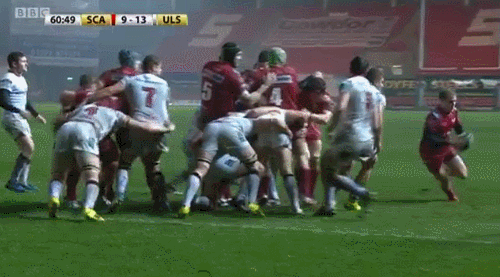Many predicted that there will be a lot of contentious calls at the weekend as the first major round of fixtures took place under World Rugby’s new tackle laws…
…and they weren’t wrong.
- Increasing the level of interpretation surrounding referee’s decisions;
- taking the physicality out of the game;
- potentially losing the essence or spirit of the game;
All valid arguments and concerns voiced by the rugby public in the wake of World Rugby’s ‘new’ tackle laws.
In fact, these rules aren’t new.
A high tackle remains a high tackle, it is the level of punishment rather for both a ‘reckless’ and ‘accidental’ high tackle which has changed.
A reckless tackle of this kind now warrants a minimum sanction of a yellow card and a maximum sanction of a red card.
Accidental high tackles require a minimum sanction of a penalty with no maximum sanction stated – assuming that if the accidental tackle is also deemed reckless then it will fall under the reckless category of sanctions.
Sound confusing? Well it is a bit.
What can be said is that this no doubt puts even further pressure on referees and adds yet another layer of interpretation to a sport littered with complex rules.
Well said sir https://t.co/UzYYyjjrzF
— SportsJOE (@SportsJOEdotie) January 7, 2017
No doubt World Rugby need to be seen to be doing something to stem the tide of the concussion epidemic sweeping the sport.
This is a first step to do that but it will take time for both players, officials, fans and coaching staff to become comfortable with the new regulations surrounding high tackles.
Unsurprisingly, the weekend was filled with contentious decisions which left fans, players and management fuming.
Sean Reidy Yellow Card for Ulster
One of the first incidents of the weekend took place in Ulster’s 16-13 loss to the Scarlets.
Reidy was yellow carded for the incident below where he places his arm over the shoulder and down the chest of the Scarlets ball carrier.
This is not a reckless challenge by Reidy, at a push it could be deemed a high tackle as the Scarlets player’s head is lowering into the challenge by Reidy.
It is clearly accidental and not reckless. Therefore it should have been a minimum sanction of a penalty and no yellow card.
If anyone is to receive a yellow card in this instance it would be Andrew Trimble, who leads with a stiff left arm to the face of scrum-half Aled Davies.
Richard Barrington Red Card for Saracens
In the 10th minute of Saracens clash with the Exeter Chiefs, Sarcacen’s players, Richard Barrington, was sent off as his shoulder collided with the head of former England international, Geoff Parling.
However was this challenge truly reckless or could it have been deemed accidental?
https://twitter.com/Smallclone/status/817752209391779846
Barrington should have gotten lower to avoid contact with Parling’s head and he makes little attempt to wrap the arms here.
As a result, you can see why this is a red card.
Like in the Ulster example above, Brad Barritt initially makes a tackle attempt with a stiff arm which makes contact with Parling’s head.
Definitely reckless.
Perhaps both players should have received punishment here but we can’t imagine many referees who would send off two players for the one tackle.
High Tackle on Caolin Blade
Connacht’s loss to the Ospreys was in no way due to this incident but Pat Lam can feel aggrieved either way with how this reckless tackle didn’t even warrant a yellow card.
No yellow card for this? Prepare for utter mayhem with this new rule pic.twitter.com/NvClx55OHF
— Tom English (@TEnglishSport) January 7, 2017
Blade literally has arms wrapped around his neck in this incident which to us seems to give the referee the clearest and easiest of decisions.
High tackle on Munster’s Tommy O’Donnell
Unfortunately there is no footage of this incident but if you were watching this match you might recall Tommy O’Donnell being on the recieving end of a high tackle from Racing 92 player, Chris Masoe.
Masoe’s arm shuddered into the jaw of O’Donnell and it left the Tipperary man dazed and requiring treatment for a couple of minutes.
The Sky Sports pundits and the twitter public were adamant that it should have been a yellow card.
Of all the high tackle incidents this weekend, that shot on Tommy O'Donnell is the most yellow card worthy, or more.
— @bhhooker.bsky.social (@BHHooker) January 7, 2017
There were always going to be controversial calls during the first round of fixtures since the law change was fully implemented – but with the Six Nations only a few weeks away, one would hope that the referees and officials can become more consistent on this issue, as the tournament could well be decided on the finest of margins.






































